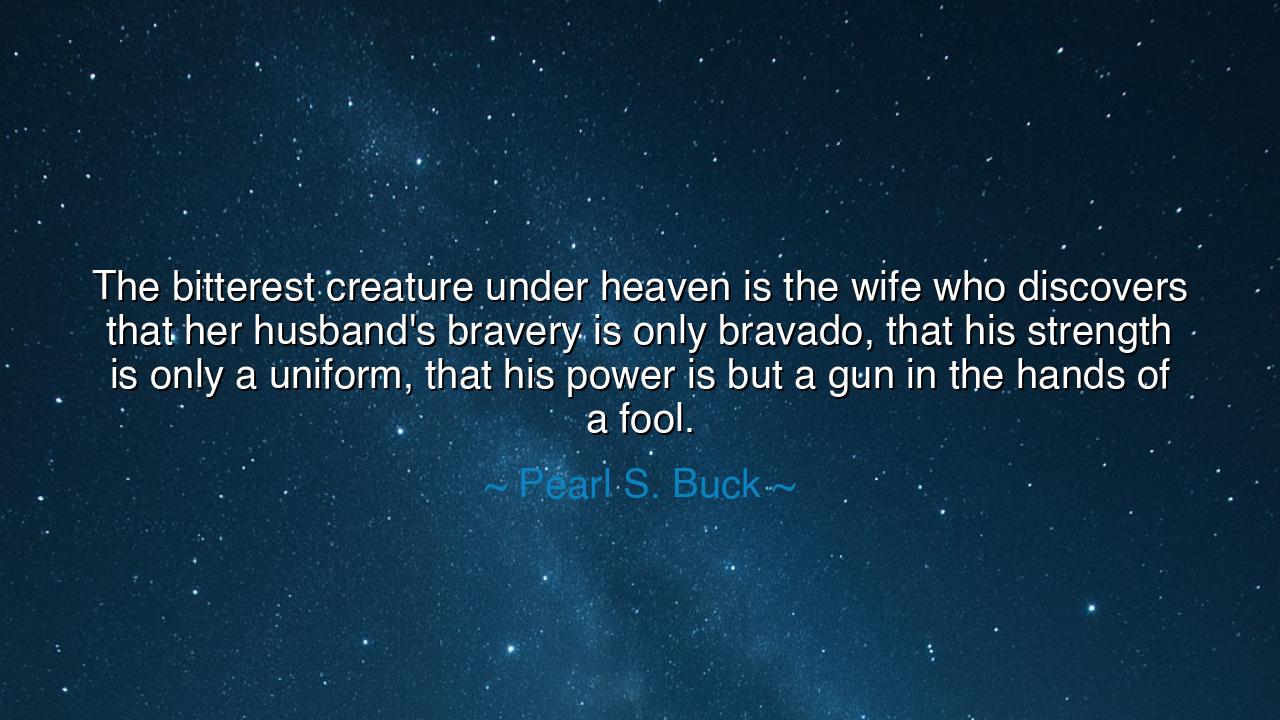
The bitterest creature under heaven is the wife who discovers
The bitterest creature under heaven is the wife who discovers that her husband's bravery is only bravado, that his strength is only a uniform, that his power is but a gun in the hands of a fool.






Hear, O seekers of truth, the voice of Pearl S. Buck, who saw into the hearts of men and women and spoke with unflinching clarity: “The bitterest creature under heaven is the wife who discovers that her husband's bravery is only bravado, that his strength is only a uniform, that his power is but a gun in the hands of a fool.” These words pierce like an arrow, for they reveal the gulf between appearance and reality, between what a man pretends to be and what he truly is. They speak of betrayal—not the betrayal of flesh, but of essence, when a man’s soul proves hollow before the one who trusted him most.
The bitterest creature is not born bitter, but made so through disillusionment. For a wife who has given her trust, her love, her devotion, expects in return not perfection but authenticity. When she discovers that the courage she admired was mere bravado, the strength she relied upon was only costume, and the power that seemed noble is wielded foolishly, her heart breaks not only with sorrow, but with contempt. Such betrayal is deeper than infidelity—it is the shattering of the very foundation upon which love and respect are built.
Bravado, O listeners, is the shadow of bravery. It is loud where true courage is quiet, boastful where true strength is steady. The uniform, though it may command respect, cannot make a man strong in spirit; it is but cloth and symbol. And the gun, though it gives the weak the illusion of power, reveals nothing of wisdom or justice in the hand that holds it. To build one’s worth on these alone is to construct a temple of straw, destined to fall when tested by storm.
History offers many such examples. Recall the reign of Benito Mussolini, who strutted with pomp and thunder, adorning himself with uniforms, speeches, and parades. He boasted of courage, but it was empty boasting. When the true test came—when his nation faltered—his power dissolved like mist. The people who once cheered turned bitter, for they discovered that his bravery was performance, his strength mere display, his power the weapon of a fool. The bitterness of disillusionment is always sharpest among those who once believed.
Contrast this with the quiet strength of George Washington, who wore a uniform but was never defined by it. His bravery was not a show, but a steady resolve through years of war and hardship. His power lay not in weapons alone but in character, in restraint, in the humility that refused the crown of a king. The people did not grow bitter under him, but reverent, for they found his strength was real and his courage genuine. Thus the difference between bravado and bravery is not small—it is the difference between a fool’s mask and a hero’s heart.
O children of tomorrow, learn from Buck’s warning. Do not mistake noise for courage, nor symbols for strength. Seek not power that is borrowed from weapons or garments, but power that arises from integrity, from truth, from the courage to endure. For the respect of others—and most especially the respect of those who love you—cannot be won by costume or by boasting. It can only be earned by the authenticity of your soul.
Practical is this counsel: strip away the masks you wear before the world. If you wish to be brave, practice courage in silence. If you wish to be strong, cultivate patience, endurance, and mercy. If you wield power, wield it with wisdom, for power without wisdom is folly. And above all, let those who trust you never find that you are less than you seemed, for the bitterness of disillusionment is a wound that does not heal.
Thus remember the words of Pearl S. Buck: “The bitterest creature under heaven is the wife who discovers…” Let them guide you to live with truth, to build strength that does not depend on uniform or weapon, to let your bravery be more than noise. For only then will you walk as one who inspires respect, love, and remembrance—not bitterness, but honor, in the hearts of those who know you best.






AAdministratorAdministrator
Welcome, honored guests. Please leave a comment, we will respond soon